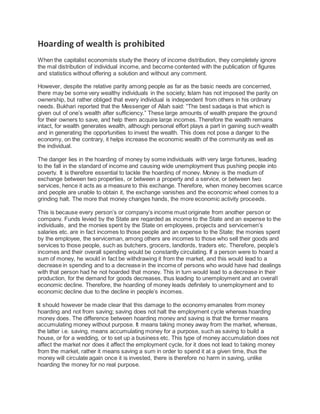Hoarding of wealth is prohibited
- 1. Hoarding of wealth is prohibited When the capitalist economists study the theory of income distribution, they completely ignore the mal distribution of individual income, and become contented with the publication of figures and statistics without offering a solution and without any comment. However, despite the relative parity among people as far as the basic needs are concerned, there may be some very wealthy individuals in the society; Islam has not imposed the parity on ownership, but rather obliged that every individual is independent from others in his ordinary needs. Bukhari reported that the Messenger of Allah said: “The best sadaqa is that which is given out of one’s wealth after sufficiency.” These large amounts of wealth prepare the ground for their owners to save, and help them acquire large incomes. Therefore the wealth remains intact, for wealth generates wealth, although personal effort plays a part in gaining such wealth and in generating the opportunities to invest the wealth. This does not pose a danger to the economy, on the contrary, it helps increase the economic wealth of the community as well as the individual. The danger lies in the hoarding of money by some individuals with very large fortunes, leading to the fall in the standard of income and causing wide unemployment thus pushing people into poverty. It is therefore essential to tackle the hoarding of money. Money is the medium of exchange between two properties, or between a property and a service, or between two services, hence it acts as a measure to this exchange. Therefore, when money becomes scarce and people are unable to obtain it, the exchange vanishes and the economic wheel comes to a grinding halt. The more that money changes hands, the more economic activity proceeds. This is because every person’s or company’s income must originate from another person or company. Funds levied by the State are regarded as income to the State and an expense to the individuals, and the monies spent by the State on employees, projects and servicemen’s salaries etc. are in fact incomes to those people and an expense to the State; the monies spent by the employee, the serviceman, among others are incomes to those who sell their goods and services to those people, such as butchers, grocers, landlords, traders etc. Therefore, people’s incomes and their overall spending would be constantly circulating. If a person were to hoard a sum of money, he would in fact be withdrawing it from the market, and this would lead to a decrease in spending and to a decrease in the income of persons who would have had dealings with that person had he not hoarded that money. This in turn would lead to a decrease in their production, for the demand for goods decreases, thus leading to unemployment and an overall economic decline. Therefore, the hoarding of money leads definitely to unemployment and to economic decline due to the decline in people’s incomes. It should however be made clear that this damage to the economy emanates from money hoarding and not from saving; saving does not halt the employment cycle whereas hoarding money does. The difference between hoarding money and saving is that the former means accumulating money without purpose. It means taking money away from the market, whereas, the latter i.e. saving, means accumulating money for a purpose, such as saving to build a house, or for a wedding, or to set up a business etc. This type of money accumulation does not affect the market nor does it affect the employment cycle, for it does not lead to taking money from the market, rather it means saving a sum in order to spend it at a given time, thus the money will circulate again once it is invested, there is therefore no harm in saving, unlike hoarding the money for no real purpose.
- 2. Islam has made it lawful to save gold and silver, for it means the accumulation of money for a purpose.Islam has also permitted a man to save money in order to accumulate a dowry for a woman he wishes to marry, or to save money in order to go to Hajj etc. The saver would only have to pay the Zakat due on the accumulated money if it reached the Nisab and remained in his possession for a full year. When the verse was revealed prohibiting the hoarding of gold and silver, these two metals represented at the time the units of exchange and measure of the effort spent (in work) and the units of value put on goods, services and properties, whether these were minted or not; the prohibition was therefore directly linked to the fact that they represented the unit of exchange. The hoarding of gold and silver was prohibited explicitly in the Qur’an.

